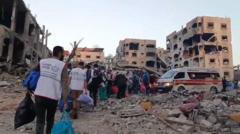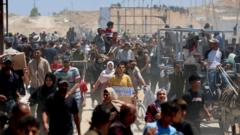The ongoing conflict in Gaza has sparked significant backlash against Israel's new humanitarian aid policy, prompting condemnation from the U.N. and European leaders, as fatalities and tensions rise among the civilian population.
Rising Tensions: Israel's Humanitarian Aid Policy Under Fire

Rising Tensions: Israel's Humanitarian Aid Policy Under Fire
As criticism mounts over Israel's handling of humanitarian aid in Gaza, international calls for a ceasefire intensify.
In a developing situation in Gaza, the United Nations has condemned Israel's recent measures to regulate humanitarian aid delivery, describing it as an “assault on their human dignity.” According to a senior U.N. official, the Israeli government's efforts, which aimed to restrict access to aid for over two months, have only exacerbated the humanitarian crisis. Israel defends its actions by claiming the system was designed to keep aid out of the hands of Hamas.
Initial reports from the U.N. World Food Program revealed tragic incidents during the distribution of aid, with two individuals reportedly losing their lives after crowds forcibly entered a food warehouse in central Gaza. On the previous day, the implementation of Israel’s new aid program resulted in numerous injuries as people rushed to a distribution site.
European officials are expressing increasing discontent with Israel’s conduct in the ongoing conflict, emphasizing the need for a truce. Kaja Kallas, the European Union’s chief diplomat, condemned the disproportionate use of force against civilians, insisting that humanitarian aid should remain apolitical.
According to Patrick Kingsley, the Jerusalem bureau chief, Israel’s justification for the new aid management—aimed at preventing Hamas from hoarding supplies—raises alarms for the U.N., which highlights the risk of endangering civilians by compelling them to travel long distances to limited aid outlets.
Amidst this backdrop, U.S. pressure mounts for a ceasefire, with President Trump’s Middle East envoy, Steve Witkoff, expressing optimism about forthcoming proposals that may lead to a long-term solution. The call for peace in the region remains a pressing priority as tensions escalate further on the ground.





















